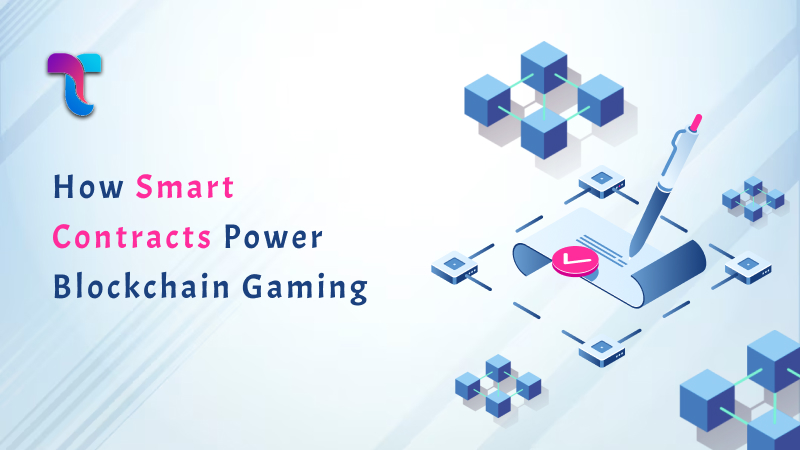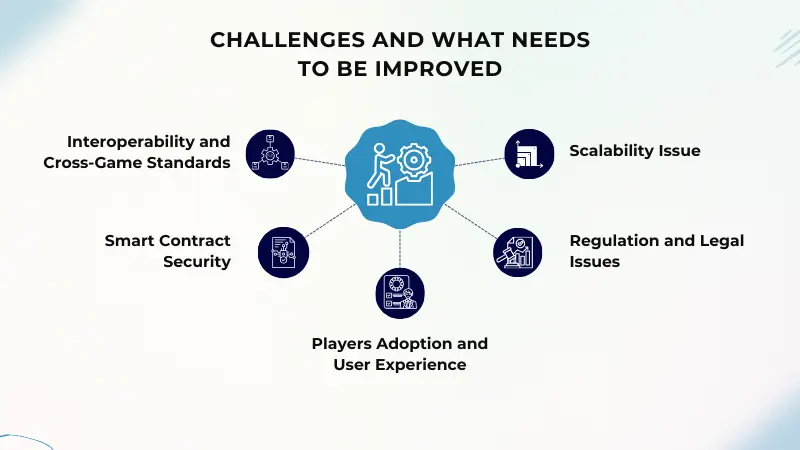Table of Contents
Smart contracts power blockchain gaming by automating in-game logic such as asset ownership, rewards distribution, and transactions on the blockchain. They ensure transparency and fairness by executing predefined rules without intermediaries, enabling trustless gameplay and NFT-based assets. This allows players to securely trade, earn, and retain real-world value from in-game items.
Have you ever wondered how your blockchain games automatically carry out transactions without any intermediaries or middlemen? the powerhouse behind all this is smart contracts.
Behind all those flashy graphics and immersive gameplay lies a technology that ensures building trust without any middlemen, giving out rewards without delays, and true asset ownership within games. While gamers enjoy immersive gameplay, smart contracts ensure the digital economy runs smoothly behind the scenes.
But the question here is, how do smart contracts do it? And why are they considered to be the spine of blockchain games? Let’s answer all that and much more in this blog.
What are smart contracts?
A smart contract is a self-executing agreement that has the terms of the agreement directly written into the lines of code that run on the blockchain. Stored on a distributed and decentralized ledger, they help to automate the transfers of assets when the set of predefined conditions mentioned in smart contracts are met, running automatically.
You can think of smart contracts as the thermostat in your house. It is programmed to turn the furnace on when the room temperature drops down to a certain point. This thermostat doesn’t need any person to manually flip the switch or make the decision.
- You as user sets the desired temperature
- The condition is met when the room temperature drops down.
- The action is the thermostat turning the furnace on.
- No third party like a landlord or handyman is needed to intervene in this process.
How Do Smart Contracts Work?
Smart contracts work on the basis of the principles of automation and cryptography. When certain predetermined conditions are satisfied, the smart contract autonomously executes the programmed action. Let’s break down how this works into simple steps:
- Code the Agreement: A computer program is written into the smart contract that will be ran automatically when the set of predefined conditional parameters are met.
- Deploy to Blockchain: The smart contract code is then deployed onto a blockchain, making it a decentralized, distributed, and immutable record.
- Trigger Conditions: The smart contract runs automatically when the predetermined conditions that are mentioned in the contract are met.
- Executed Automatically: Once triggered, the contract executes the terms of the agreement, such as transferring digital assets or automating workflow.
The decentralized nature of the blockchain guarantees that no singular entity possesses the ability to manipulate or tamper with the terms of the contract.
How Smart Contracts Improve Blockchain Gaming
Smart contracts offer several significant benefits in gaming. Some of the benefits that they offer are stated below:
Transparency
All the actions and transactions in blockchain games are recorded on the blockchain; players can see the exact state of the game and verify if the rules are being followed or not. This builds trust and credibility within the gaming community.
Security
Smart contracts eliminate the need for intermediaries and automate the process, reducing the risk of fraud or hacking. The decentralized nature also means that there is no single point of failure, enhancing the overall security of the game.
Efficiency
Smart contracts streamline various aspects of managing games, such as handling transactions, managing in-game assets, and implementing compliance with rules. This added efficiency leads to faster processing times and reduced operational expenses for game developers.
Ownership and Control
Smart contracts help to grant players true ownership of game assets like skins, weapons, achievements, or characters. These assets can be traded or sold on the blockchain marketplaces, giving players control and value from their in-game. Such features are the backbone of modern Blockchain Game Development services that empower developers and gamers alike.
Cost Reduction
The removal of intermediaries due to smart contracts helps to eliminate intermediaries and without their involvement, you can notice a massive drop in operational costs. Smart contracts help in bypassing trusted third parties like banks, notaries, or escrow agents by offering peer-to-peer transactions upon meeting certain conditions.
Challenges and What Needs To be Improved
While smart contracts offer some of the life-changing improvements to blockchain gaming, there’s still room for improvement in major fields. Some of the challenges the smart contracts need to overcome, along with their potential solutions, are as follows:
Scalability Issue
When there is a lot of traffic on the network, some blockchain networks, like Ethereum, can have slow transaction times and high gas fees. This makes real-time gameplay difficult, leading to lag and making small in-game transactions costly or impractical.
Solution: Layer 2 solutions like Polygon and Immutable X can help by processing transactions off-chain and settling them on the main blockchain in batches. This reduces congestion, lowers transaction costs, and improves speed, making real-time in-game transactions seamless for players
Regulation and Legal Issues
State government and international lawmakers are still figuring out how to regulate blockchain gaming, as it is still in its early stages. Some constitutional bodies can group out blockchain games as gambling or investment platforms that can lead to restrictions or legal issues.
Solutions: Developers are working tirelessly to comply with all these regional laws while protecting the benefits of these smart contracts. Also, integrating KYC (Know Your Customer) processes when they are necessary can also help overcome this issue.
Players Adoption and User Experience
There is still a huge chunk of players that do not understand the concept of blockchain or crypto wallets. It is still a new concept for a giant population. These issues can make the act of managing the private keys and gas fees a confusing task.
Solution: A few blockchain games now have invisible wallets or wallets that let players sign up with an email and password. This makes it easier for people who aren’t used to crypto to get started without feeling overwhelmed.
Smart Contract Security
Once smart contracts are deployed, they can’t be changed. This means that hackers can take advantage of any bugs or weaknesses, which could cost players their assets or even drain the whole game economy.
Solution: There should be rigorous audits of smart contracts by specialized firms like CertiK and Quantstamp for instance. Bug bounty programs can be of great use to encourage ethical hackers to report vulnerabilities.
Interoperability and Cross-Game Standards
At the moment, most NFTs or in-game items are only useful in the game that they are linked to, which limits their usability on other platforms.
Solution: Emerging protocols like ERC-1155 can be used to allow for more flexible asset standards. Also, projects like Enjin are aiming to create a universal token standard that can enable easier cross-game usage.
Many of these concerns and challenges are discussed in more detail in our article: Building Scalable Web3 Applications: Challenges & Solutions
What’s Next for Smart Contracts in Gaming?
Despite all the challenges and difficulties, smart contracts are finding their use in gaming due to their array of life improvements in gaming. Below is what the future holds for them:
Better Scalability for Smoother Games
Today, many blockchain networks have slow transaction times and higher fees, which can make it hard to play games in real time. To make this better, developers are working on faster and better Layer-2 solutions and more efficient consensus algorithms.
Smart NFTs
Today, most NFTs are static digital collectibles. The next wave will see NFTs that dynamically evolve based on player actions, such as an NFT sword that gains strength and visual upgrades as a player progresses through challenges.
More Mainstream Studios Joining the Wagon
Big players in games like Ubisoft and Epic Games have started to bring their games with blockchain technology support and including smart contracts to explore a diverse revenue model, secured game economies, or enabling cross-game asset ownership.
Cross-Game Economies
Smart contracts open up a whole new range of possibilities for games through ownership and interoperability. This creates a whole new way for player-driven economies to work, since your digital assets can be used in more than one blockchain game and are backed by blockchain-based ownership records.
Conclusion
This blog has shown that smart contracts are the most important part of blockchain gaming. They change the way games are made and played by automating transactions and giving players real control over their in-game items.
The message is clear for businesses and developers: smart contracts are not only powering blockchain games today, but they are also shaping the economies of gaming in the future.
At Technoloader, we are focused on creating new blockchain solutions, such as smart contract development and gaming ecosystems that are both safe and scalable. Our team can help you make your ideas a reality if you want to explore the limitless possibilities of blockchain gaming.
Get in touch with us today!
 +91 7014607737
+91 7014607737
 info@technoloader.com
info@technoloader.com




